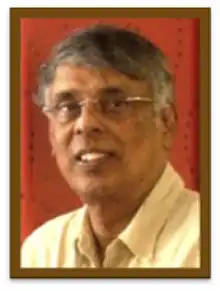
Nagabhushan "Rao Machiraju" is an Indian American scientist and business executive, and holds 10 patents in information retrieval.
Background and career
He has an interdisciplinary educational background: Masters in Public Health (M.P.H. from California State University, Northridge), he studied General Systems and Information Networks under James Grier Miller and Kjell Samuelson (Certificate from United Nations Institute for Training and Research, University of Stockholm and UCLA), and Ed.D in Instructional Technology'(Doctorate from University of Southern California).[1][2] He was an Executive in Residence and co-director of Center for Human Applied Reasoning and the Internet of Things, (Chariot) at the University of Southern California.[3] Formerly he was a Co-founder and the CEO of reQall Inc., an MIT Media Lab spin off, a former advisor to Dimagi with Sandy Pentland,[4] and a NASA Research Partner.[5][6][7] He is also the co-founder of Magically Inc.,[8][9][10] N. Rao Machiraju, was a Principal Scientist at Apple Inc., heading various groups including The Advanced Technology Group (ATG) Learning Communities Laboratory.[11][12] Rao and his team have won the 1993 Optimas Award for Innovation and Excellence for Apple Inc.[13] Rao also was a co-founder of Magically Inc[14][15] and ConceptLabs.[16][17]
Rao worked on a number of research and development efforts in information retrieval, organizational memory, wrote a number of articles and also lectured extensively.[18][19] In 1996, the term "location sense" was coined by Rao Machiraju to refer to a capability of a device that can ascertain its location.[20] Rao was also on the editorial boards of Journal of Expert Systems and Journal of Telematics and Informatics as a Founding member. He was also on the Board of Councilors of National Science Foundation Engineering Research Center on Multi-Media Computing in (Integrated Media Systems Center) at the University of Southern California,[21][22] and served on the advisory board of Dimagi.com, an MIT Medialab spin off.[23] Rao also served as Chief Mentor for Ventura Technology Incubator.[24][25] He is also a faculty member at USC.[26]
Research and publications
- The ATG Learning Communities Laboratory - An Overview by N.Rao Machiraju.[27][28]
- Apple's Education Research Agenda by N. Rao Machiraju.[29]
- A study of the usage of an international computer communications network: its implications for distance education.[30][31]
- Handheld computers for Rural Healthcare: Experiences in a Large Scale Implementation.[32][33][34][35]
- Microcomputer-based informatics: some training considerations.[36]
- Telematics and Informatics: An International Journal on Telecommunications & Information Technology.[37]
- International informatics access '87.[38]
References
- ↑ "Seminar on People Computers and Design, at Stanford university". Stanford University. Retrieved 2011-06-25.
- ↑ "reQall Team". reQall.com. Archived from the original on 2011-07-25. Retrieved 2011-06-25.
- ↑ "New research center envisions the Internet of Things applied to personalized learning".
- ↑ "reQall's CEO on 'reqallable in-car to help reduce distracted driving'". www.csun.edu. 14 September 2016.
- ↑ "reQall Team". reQall.com. Archived from the original on 2011-07-25. Retrieved 2011-06-25.
- ↑ "Spin-Offs; MIT Media Lab". Media.mit.edu. Retrieved 2011-06-25.
- ↑ "NASA Research Park". Researchpark.arc.nasa.gov. Archived from the original on 2011-07-27. Retrieved 2011-06-25.
- ↑ "Magically Inc. Executive Team". magically.com. Retrieved 2011-06-25.
- ↑ "Virtual Desktop for Mac users stores files via web". Magically Inc. Press Release. Retrieved 2011-06-25.
- ↑ Dunn, Ashley (1999-02-22). "'Webtop' Services for the Computer Commuter". Los Angeles Times. Retrieved 2011-06-25.
- ↑ Machiraju, N. Rao (April 1998). "Association for Computing Machinery". ACM Sigchi Bulletin. deepdyve.com. 30 (2): 106–107. doi:10.1145/279044.279169. S2CID 37126105. Retrieved 2011-07-01.
- ↑ "1993 Innovation Optimas Award Profile: Apple Computer Inc" (PDF). Workforce.com. Retrieved 2011-06-25.
- ↑ "Innova Optimus award" (PDF). Implicity Learning. Retrieved 2011-06-25.
- ↑ "'Webtop' Services for the Computer Commuter". Los Angeles Times. 1999-02-22. Retrieved 2021-03-05.
- ↑
- ↑ "IMSC Board of Councillors" (PDF). IMSC, University of Southern California. Retrieved 2011-06-25.
- ↑ "Insta-Firms: Just Add Dollars". Forbes.com. Archived from the original on January 28, 2001. Retrieved 2011-06-25.
- ↑ "Seminar at Stanford university - Heat and Dust: Designing Solutions on the Other Side of the World". Stanford University. Retrieved 2011-06-25.
- ↑ "CSLI Calendar of events". CSLI, Stanford University. Retrieved 2011-06-25.
- ↑ "WorldBoard: What Comes After the WWW?". Service Science. 5 April 2012. Retrieved 2012-07-02.
- ↑ "IMSC begins new inititatives to transfer technology" (PDF). IMSC News. Retrieved 2011-07-01.
- ↑ "IMSC Board of Councillors, NSF Engineering Research Center" (PDF). Integrated Media Systems Center, University of Southern California. Retrieved 2011-06-25.
- ↑ "Dimagi Advisors". dimagi.com. Retrieved 2011-06-27.
- ↑ "Former Apple scientist plans to open Ventura office". vcstar.com. Retrieved 2011-07-01.
- ↑ "Startup's founder helps to lead the way as Ventura Ventures Technology Center takes shape: Hatching ideas". TMCnet.com. Retrieved 2011-07-01.
- ↑ "Nagabhushan Machiraju". Press Room. 2017-04-19. Retrieved 2021-03-05.
- ↑ Machiraju, N. Rao (April 1998). "The ATG Learning Communities Laboratory - An Overview". ACM Sigchi Bulletin. deepdyve.com. 30 (2): 106–107. doi:10.1145/279044.279169. S2CID 37126105. Retrieved 2011-06-25.
- ↑ Machiraju, N. Rao (April 1998). "The ATG Learning Communities Laboratory - An Overview". ACM Sigchi Bulletin. ACM Digital Library. 30 (2): 106–107. doi:10.1145/279044.279169. S2CID 37126105. Retrieved 2011-06-25.
- ↑ "Apple's Education Research Agenda by N. Rao Machiraju" (PDF). SySDOC. Retrieved 2011-06-25.
- ↑ Machiraju, Nagabhushan Rao (1987). A study of the usage of an international computer communications network: its implications for distance education (phd). ACM Digital Library. Retrieved 2011-06-25.
- ↑ Machiraju, Nagabhushan Rao (1987). A study of the usage of an international computer communications network: it's [sic] implications for distance education. Retrieved 2011-06-25.
- ↑ "Handheld computers for rural healthcare: Experiences from research concept to global operations" (PDF). nextlab.mit.edu. Retrieved 2011-06-25.
- ↑ "kaash.sourceforge.net" (PDF). kaash.sourceforge.net. Retrieved 2011-06-25.
- ↑ "academic.research.microsoft.com". Microsoft.com. Retrieved 2011-06-25.
- ↑ "TierStore: A Distributed Filesystem for Challenged Networks in Developing Regions". usenix.org. Retrieved 2011-06-25.
- ↑ Havard, Russell; Machiraju, N. Rao (1987). "Microcomputer-based informatics: some training considerations". Telematics and Informatics. ACM Digital Library. 4 (3): 215–220. doi:10.1016/S0736-5853(87)80033-3. Retrieved 2011-06-25.
- ↑ Telematics and Informatics: An International Journal on Telecommunications & Information Technology. 1992. Retrieved 2011-06-25.
- ↑ International informatics access '87. 1987. Retrieved 2011-06-25.